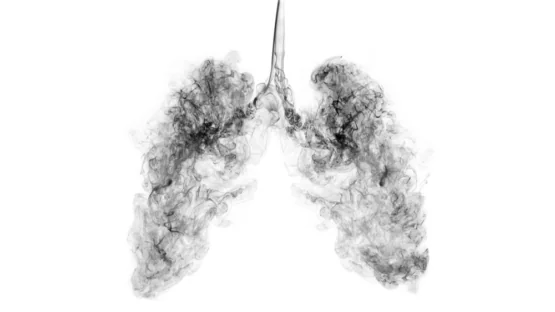A new study published in Nature Medicine suggests that lifelong exposure to tiny airborne particles leads to their accumulation in lymph nodes in the lungs and to impaired immune function [1].
Age-related lung diseases and pollution
With age, people become more susceptible to many diseases, with the lungs being one of the most affected organs. Lung cancer is highly age-related, and prognoses are worse in older people [2]. As we know from the COVID-19 and the annual flu epidemics, infectious diseases that attack lungs also become much deadlier with age [3]. Could it be that lifelong exposure to air pollution contributes to pulmonary decline?
In this new study, the researchers were able to put this hypothesis to the test using actual human lymph nodes obtained from 84 organ donors aged 11 to 93 with no history of smoking. Lymph nodes house immune cells and are at the center of the immune response that is supposed to protect against both cancer and infections.
Particles accumulate in macrophages
The first thing the researchers noticed was that lung lymph nodes were often black in color, contrary to intestinal lymph nodes. The prevalence of black lung lymph nodes was much higher in older donors, matching the color of the most ubiquitous air pollutants from burning fuels. Microscopy images confirmed the accumulation of particulate matter with age, especially past the age of 40, in lung lymph nodes but not in intestinal lymph nodes.
Lymph nodes are complex structures that contain immune cells of various types. The researchers hypothesized that particulates are mainly found within innate immune cells that can engulf foreign pathogens in a process called phagocytosis. In lymph nodes, those are mostly macrophages and dendritic cells. As expected, particulate matter was found almost exclusively in a subset of cells called CD68+CD169- macrophages. Those cells are the most active scavengers of dying and dead cells and other debris.
Decreased phagocytosis
The researchers then went on to determine if particle accumulation actually affects macrophage function. Controlling for other variables, such as age, they found that key activation and phagocytosis markers decrease with age specifically in CD68+CD169− macrophages in lung lymph nodes but not in intestinal lymph nodes.
To further investigate this loss of function, the researchers assessed the actual effects of carbon particulates that they had isolated from urban environmental sources on human macrophages in vitro. The cells readily devoured the black particles, but this hampered their phagocytic abilities compared to particle-free controls.
Interestingly, particle accumulation did not affect the proliferation of the macrophages, but aging did. The researchers suggest that with age, the proliferation, and hence the turnover, of macrophages slows down. Cells spend more time in the lymph nodes before being replaced with new cells, which leads to more particle accumulation.
Altered cytokine production
In addition to engulfing pathogens, macrophages also secrete cytokines that modulate the immune response. By staining lymph nodes with antibodies, the researchers found that black particulates significantly decrease the production of the antiviral cytokine IFN-α and of the pro-inflammatory cytokines TNF-α and IL-6, indicating loss of function.
Accumulation of particles also affected the complex architecture of lymph nodes. Follicles that contain B cells became more dispersed, and the number of lymphatic vessels declined with age in the areas affected by particle accumulation. In contrast, no such structural changes were observed in intestinal lymph nodes, which apparently do not suffer from accumulation of airborne particles.
In conclusion, our results provide direct evidence that the environment can have cumulative and adverse effects on our immune system with age. We show how environmental pollutants specifically target immune cells within lymphoid organs, which carry out essential immune surveillance functions. These findings can inform how we monitor and study our immune system—in health and disease and with age.
Conclusion
Air pollution has been linked to various health problems [4], but the underlying mechanisms are still being investigated. In this study, the researchers were able to use actual human organs to lend some support to the idea that air pollution contributes to age-related decline in immune response that disproportionately affects lungs.
Literature
[1] Ural, B. B., Caron, D. P., Dogra, P., Wells, S. B., Szabo, P. A., Granot, T., … & Farber, D. L. (2022). Inhaled particulate accumulation with age impairs immune function and architecture in human lung lymph nodes. Nature Medicine, 1-11.
[2] Tas, F., Ciftci, R., Kilic, L., & Karabulut, S. (2013). Age is a prognostic factor affecting survival in lung cancer patients. Oncology letters, 6(5), 1507-1513.
[3] Meiners, S., Eickelberg, O., & Königshoff, M. (2015). Hallmarks of the ageing lung. European Respiratory Journal, 45(3), 807-827.
[4] Brunekreef, B., & Holgate, S. T. (2002). Air pollution and health. The lancet, 360(9341), 1233-1242.





